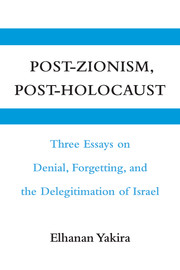2 - The Holocaust and the Good Israelis
Published online by Cambridge University Press: 05 June 2012
Summary
FIND THE DIFFERENCES
Consider this:
No, Israel has no right to exist, although, let it be said, the same applies to every state and nation. Every attempt to criticize Israel is fended off by a single weapon: the religion of the “Holocaust” and the “genocide.” The fuller, more shocking formula used to silence argument is: the six million Jews who were “exterminated” during the war by the Nazis. Why six million? The truth is, this number is much more effective than the (more realistic) figure of one million (although, at bottom, from a human point of view, there is no difference!). Indeed, it is a number that has acquired a religious significance. It is enough to mention “the six million” to put an end to any criticism of Israel or Zionism, just as holding up a cross or a bulb of garlic stops a vampire.
It is unlikely that the saga of the slain Jewish people will be one of flood, war, or akeda [sacrificial killing, as in the Binding of Isaac]. More likely it will be a story of revelation. It is the absolute, the divine, that is the source of the evil. Until absolute evil came along, no one believed there was a hidden law governing all manifestations of evil in the world. Until then, no one put his trust in a unique, transcendent, absolute evil, the meaning of our life and death, the logic of our finitude and suffering, the rock of our destruction, the promise of our perdition. […]
- Type
- Chapter
- Information
- Post-Zionism, Post-HolocaustThree Essays on Denial, Forgetting, and the Delegitimation of Israel, pp. 63 - 219Publisher: Cambridge University PressPrint publication year: 2009

